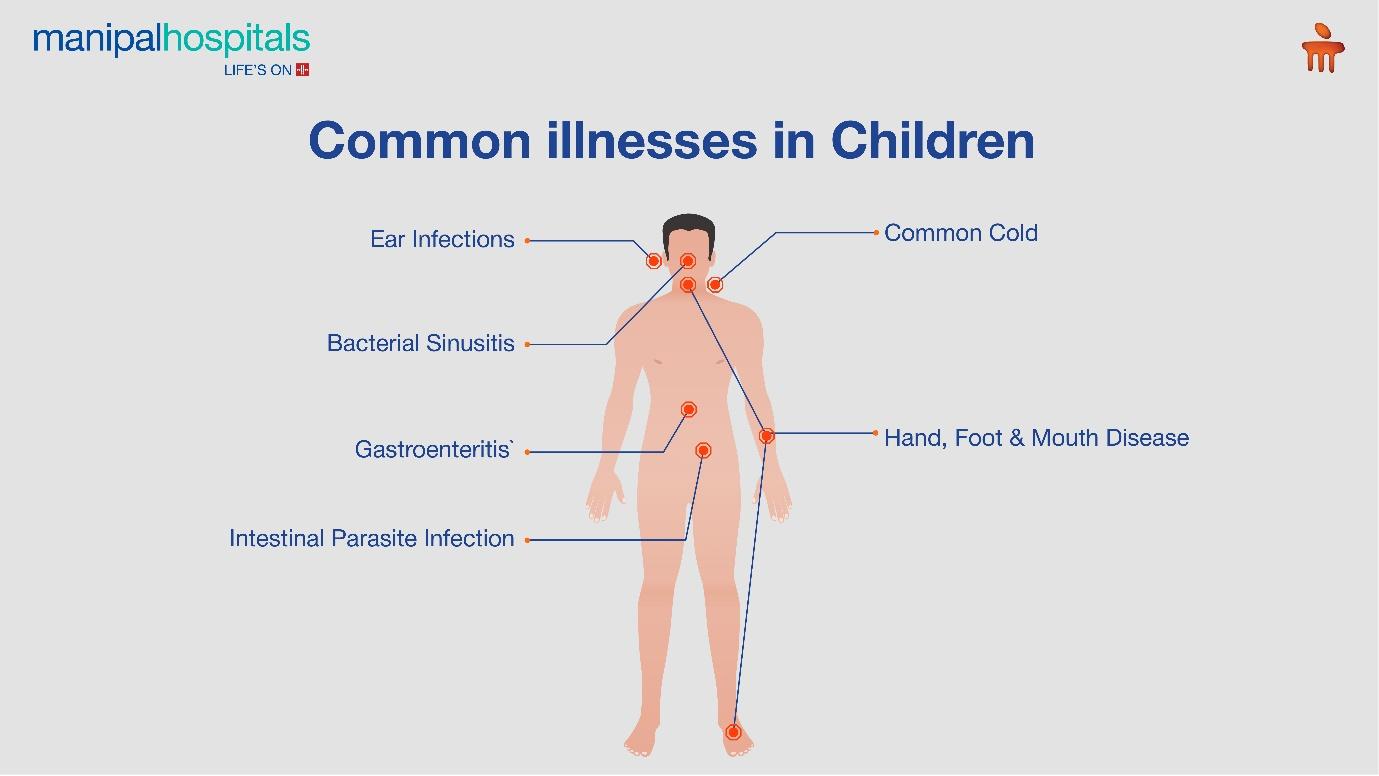
Watching your child fall sick can be worrying, especially when it happens often. But the truth is, frequent illnesses are a normal part of growing up. Children’s immune systems are still learning to fight off germs, which makes them more vulnerable to common childhood illnesses. Add to that changing weather, pollution, and school exposure, and it's no surprise they catch colds or fevers so easily.
As a parent, understanding these illnesses and how to manage them can make a big difference. It is both for your child’s comfort and your peace of mind. Let’s look closer at some of the most common childhood illnesses and how you can care for your little one through them.
Synopsis
Common Cold
The common cold is one of the most frequent childhood illnesses, especially in school-going children. It’s caused by a group of viruses and spreads easily in crowded places. Cold signs may include a runny or blocked nose, sneezing, cold symptoms, sore throat, cough, and a mild fever. In most cases, proper care at home can help resolve the cold in about a week. If symptoms persist or worsen, despite that, consulting your paediatrician is advisable.
How to manage a common cold
-
Let the child take ample rest
-
Emphasise the intake of fluids to keep your child hydrated
-
Use a humidifier to help with congestion
-
For infants, use saline nasal drops and bulb suction
-
Avoid antibiotics as they play no role against viruses

Ear Infections
Middle Ear Infections (Otitis Media) result in a painful condition that often follows a cold. Caused by bacteria or viruses, these infections are more common among younger children, leading to ear pain, fussiness, trouble sleeping, and sometimes fever. For cold signs or symptoms that persist beyond two days or a fluid discharge, consulting the doctor is essential.
How to manage ear infections?
-
Mild cases improve on their own
-
Pain relievers can help ease discomfort
-
Warm compressions on the ear may provide relief from pain
Hand, Foot, and Mouth Disease
HFMD is a contagious childhood illness that affects children under 5. Caused by a virus, it leads to fever, painful mouth sores, and rashes on the hands and feet. Though it looks serious, it usually resolves in a week.
How to manage HFMD:
-
Give the child cool fluids to keep them hydrated
-
Keep them away from spicy or acidic foods to avoid irritating mouth sores
-
Encourage them to practice hygiene to prevent the condition from spreading
Gastroenteritis (Stomach Flu)
This is another common childhood illness often caused by rotavirus or norovirus. It is commonly known as the Stomach flu. This spreads quickly through contaminated food, water, or contact with infected surfaces. Symptoms include vomiting, diarrhoea, stomach cramps, and fever.
How to manage stomach flu?
-
Keep the child hydrated with Oral Rehydration Solution (ORS)
-
In case of aggravated symptoms, avoid sugary drinks or dairy products
-
Introduce bland food like rice, mashed potatoes or toast before shifting back to a normal diet
-
In case of persistent vomiting, dehydration or blood in the stool, seek immediate medical help
Bacterial Sinusitis
Bacterial Sinusitis is a common yet non-contagious infection among children that needs antibiotics in most cases. Care given at home can accelerate recovery. The purpose is to keep the sinuses moist for relief. The kid should stay at home and rest during this phase. Consulting with your doctor becomes important if the symptoms continue for more than 10 days or seem to worsen over time.
How to manage bacterial sinusitis
-
Nasal saline rinses help clear mucus
-
Use a humidifier or steam inhalation
-
Warm compresses relieve sinus pressure
-
Make sure your child drinks enough fluids
-
Visit your doctor if symptoms last over 10 days
Intestinal Parasite Infection
Parasites can enter your child’s system through unclean food or water, causing abdominal pain, itching, diarrhoea, vomiting, or even weight loss. These infections are fairly common and can easily recur without proper hygiene.
How to manage
-
Anti-parasitic medications prescribed by the doctor are a must for killing the worms and preventing re-infection
-
Serve well-cooked food and do not feed raw or uncooked fish or meat
-
Provide purified water for drinking
-
Teach your child to wash hands frequently and practice basic hygiene to prevent recurrence
Conclusion
Childhood illnesses, in most cases are not serious. They resolve on their own. Yet, at times, they can be challenging for both children and parents. Identifying the symptoms early and seeking medical advice on time is the key to a fast and complete recovery. Always consult a doctor if symptoms get severe, persist for a long time, or appear unusual. Remember, good hygiene practices, up-to-date vaccinations, and a balanced diet can go a long way in reducing the frequency and severity of common childhood illnesses.
FAQ's
Encourage healthy habits like hand washing/sanitising and teach them basic hygiene practices. Serve them a healthy and balanced diet. Do not miss their vaccines.
These conditions can potentially interfere with a child’s physical, emotional and cognitive development, thereby delaying growth.
Frequent infections and illnesses can increase the risk of health problems like asthma, allergies, metabolic disorders, and recurrent severe infections in the future.
Keep your child home if they have-
-
Fever
-
Diarrhoea
-
Vomiting
-
Skin rashes
-
Conjunctivitis
-
Infection
Viral infections mostly resolve in a few days and are not responsive to antibiotics. Bacterial infections, on the other hand, cause persistent high fever and call for medical evaluation and antibiotics.





















 5 Min Read
5 Min Read





















